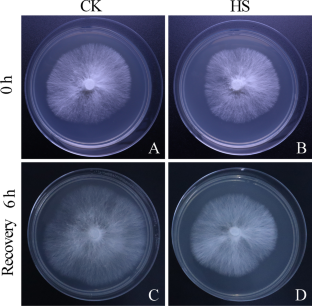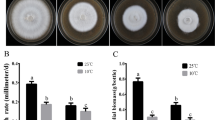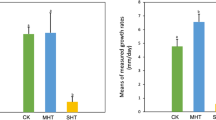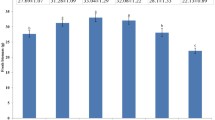Abstract
Pleurotus pulmonarius is a medium temperature edible mushroom, and its yield and quality are severely affected by high temperature. However, the molecular mechanism of Pleurotus pulmonarius response to heat stress remains unknown. In this study, transcriptome sequencing and analysis of Pleurotus pulmonarius mycelia under heat stress were performed, related differentially expressed genes (DEGs) were verified by fluorescence quantitative PCR (qPCR) and the reduced glutathione content was detected. 5906 DEGs, including 1086 upregulated and 4820 downregulated, were identified by RNA-Seq. GO analysis revealed that DEGs were mainly enriched in the pathways of Aminoacyl-tRNA biosynthesis, pyrimidine metabolism, arginine and proline metabolism, fructose and mannose metabolism, and glutathione metabolism. qPCR analysis showed that the expression of ggt decreased after heat stress treatment, while gst2 and gst3 increased. The glutathione content in mycelia after heat stress was significantly higher than that in the control group. These results suggest that glutathione metabolism may play an important role in the response to heat stress. Our study will provide a molecular-level perspective on fungal response to heat stress and a basis for research on fungal environmental response and molecular breeding.






Similar content being viewed by others
Data availability
No datasets were generated or analysed during the current study.
Abbreviations
- DEGs:
-
Differentially expressed genes
- qPCR:
-
Quantitative real-time polymerase chain reaction
- GST:
-
Glutathione-S-transferase
- GSH:
-
Glutathione
- PDA:
-
Potato dextrose agar
- GO:
-
Gene ontology
- KEGG:
-
Kyoto Encyclopedia of Genes and Genomes
- GAPDH:
-
Glyceraldehyde-3-phosphate dehydrogenase
- ROS:
-
Reactive oxygen species
References
Anjum NA, Gill R, Kaushik M et al (2015) ATP-sulfurylase, sulfur-compounds, and plant stress tolerance. Front Plant Sci 6:210. https://doi.org/10.3389/fpls.2015.00210
Bao DP, Xie BG (2020) Some research directions worthy of attention in the genetics of edible mushrooms in China. Mycosystema 6:971–976. https://doi.org/10.13346/j.mycosystema.200168
Cui B, Wang JQ, Song CX et al (2016) Cloning and expression analysis of SOC1 gene from Phalaenopsis. Mol Plant Breed 14(3):548–553. https://doi.org/10.13271/j.mpb.014.000548
Dillies MA, Rau A, Aubert J et al (2013) A comprehensive evaluation of normalization methods for Illumina high-throughput RNA sequencing data analysis. Brief Bioinform 14(6):671–683. https://doi.org/10.1093/bib/bbs046
Grabherr MG, Haas BJ, Yassour M et al (2011) Full-length transcriptome assembly from RNA-seq data without a reference genome. Nat Biotechnol 29(7):644–652. https://doi.org/10.1038/nbt.1883
Hao H, Zhang J, Wang Q et al (2022) Transcriptome and differentially expressed gene profiles in mycelium, primordium and fruiting body development in Stropharia rugosoannulata. Genes (basel) 3(6):1080. https://doi.org/10.3390/genes13061080
Kanehisa M, Araki M, Goto S et al (2008) KEGG for linking genomes to life and the environment. Nucleic Acids Res 36:D480–D484. https://doi.org/10.1093/nar/gkm882
Lee J, Nam JY, Jang H et al (2020) Comprehensive transcriptome resource for response to phytohormone-induced signaling in Capsicum annuum L. BMC Res Notes 13(1):440. https://doi.org/10.1186/s13104-020-05281-1
Liu XM, Wu XL, Gao W et al (2019) Protective roles of trehalose in Pleurotus pulmonarius during heat stress response. J Integr Agric 18(2):428–437. https://doi.org/10.1016/S2095-3119(18)62010-6
Liu XB, Xia EH, Li M et al (2020b) Transcriptome data reveal conserved patterns of fruiting body development and response to heat stress in the mushroom-forming fungus Flammulina filiformis. PLoS ONE 15(10):e0239890. https://doi.org/10.1371/journal.pone.0239890
Liu D, Sun X, Diao W et al (2022) Comparative transcriptome analysis revealed candidate genes involved in fruiting body development and sporulation in Ganoderma lucidum. Arch Microbiol 204(8):514. https://doi.org/10.1007/s00203-022-03088-1
Liu LY, Zhou Y, Chen H et al (2020a) Research progress of Pleurotus geesteranus. Microbiol China 11:3650–3657. https://doi.org/10.13344/j.microbiol.china.200504
Pócsi I, Prade RA, Penninckx MJ (2004) Glutathione, altruistic metabolite in fungi. Adv Microb Physiol 49:1–76. https://doi.org/10.1016/S0065-2911(04)49001-8
Tang X, Ding X, Hou YL (2020) Comparative analysis of transcriptomes revealed the molecular mechanism of development of Tricholoma matsutake at different stages of fruiting bodies. Food Sci Biotechnol 29(7):939–951. https://doi.org/10.1007/s10068-020-00732-8
Vidal-Diez de Ulzurrun G, Lee YY, Stajich JE et al (2021) Genomic analyses of two Italian oyster mushroom Pleurotus pulmonarius strains. G3 (Bethesda) 11(2):2160–1836. https://doi.org/10.1093/g3journal/jkaa007
Wang B, Zhang TX, Zhao Q et al (2021) Application progress of plant metabonomics in medicinal plants. Chinese Arch Tradit Chinese Med 39(5):28–31. https://doi.org/10.13193/j.issn.1673-7717.2021.05.008
Young MD, Wakefield MJ, Smyth GK et al (2010) Gene ontology analysis for RNA-seq: accounting for selection bias. Genome Biol 11:R14. https://doi.org/10.1186/gb-2010-11-2-r14
Acknowledgements
The authors gratefully acknowledge the supports of the Westlake University, Jin Weiyuan.
Funding
This research has been funded by Zhejiang Major Science and Technology Projects of New Agricultural Varieties Breeding (2021C02073) and Project of Administration of Traditional Chinese Medicine of Zhejiang Province of China (2024ZF049).
Author information
Authors and Affiliations
Contributions
WW: conceptualization, project administration, writing—original draft. CG: resources, supervision, methodology, investigation, project administration, writing—review and editing. LN: conceptualization, supervision, writing—review and editing. LJ: methodology, resources. LL: methodology, data curation, formal analysis.
Corresponding author
Ethics declarations
Ethics approval
This article does not contain any studies with human or animal subjects.
Consent to participate
Not applicable.
Consent for publication
Not applicable.
Competing interests
The authors declare no competing interests.
Additional information
Publisher's Note
Springer Nature remains neutral with regard to jurisdictional claims in published maps and institutional affiliations.
Rights and permissions
Springer Nature or its licensor (e.g. a society or other partner) holds exclusive rights to this article under a publishing agreement with the author(s) or other rightsholder(s); author self-archiving of the accepted manuscript version of this article is solely governed by the terms of such publishing agreement and applicable law.
About this article
Cite this article
Weike, W., Na, L., Jiayao, L. et al. Transcriptome analysis reveals key genes and pathways associated with heat stress in Pleurotus pulmonarius. Int Microbiol (2024). https://doi.org/10.1007/s10123-024-00536-4
Received:
Revised:
Accepted:
Published:
DOI: https://doi.org/10.1007/s10123-024-00536-4




